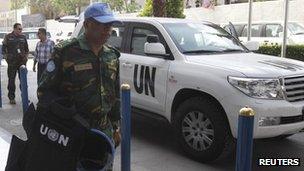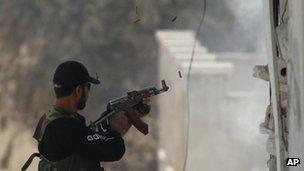UN mission in Syria at crossroads
- Published

UN observers have been told to return to base until further notice
The decision by General Robert Mood to ground his 300 or so UN observers does not necessarily mean the UNSMIS mission is over.
But it is an ominous development. The Arab League observers, who tried to play the same role in December and January, similarly had their movements curtailed before eventually being pulled out.
The general's announcement was a recognition that the observer mission, and the Kofi Annan peace plan of which it is part, have hit the rocks.
But if the international community can somehow find a way to refloat the foundering Annan plan, which remains the only hope for a peaceful resolution, the monitoring mission could be resumed.
Gen Mood made it clear that the observers would remain at their bases, ready to resume their normal activities as soon as conditions permitted.
As he had already explained in a news conference on Friday, the sharp upsurge in violence over the past 10 days had limited the monitors' ability to do their job of observing, verifying and reporting developments on the ground and trying to foster dialogue.
Cry for help
Specifically, in the past two weeks or so, observers have been physically obstructed from reaching trouble-spots, they have had their vehicles attacked, battered and shot at, and they have been close to bomb and shell explosions.
The US ambassador to the UN, Susan Rice, said some time ago that the unarmed observers were "one IED [home-made bomb] away from a disaster".
The general's announcement could be seen as a cry for help from the international powers.
Clearly, in his view, the parties on the ground - regime and rebels - are not interested in pursuing political dialogue, and are bent on maximising their military positions.
He studiously avoided taking sides or apportioning blame, referring only to "the parties" rather than specifiying the regime and the rebels.
So the only hope for implementing the Annan plan - for which the whole world, including the Syrian government, continues to aver support - lies in pressure being applied on both sides by their outside allies to abandon arms and enter dialogue.
The focal point for that process is the proposed but not yet certain international conference projected for 30 June in Geneva, to bring together all interested parties to the conflict.
While the opposition's corner would be supported in general by the Western powers and regional states such as Saudi Arabia, Qatar and Turkey, the regime's position would be bolstered by the participation of Russia, China and Iran.
Just getting all those parties together would be an achievement in itself, far less producing a credible agreement that would bring about a real change of heart and behaviour by regime and rebels.
Similar but less overt mechanisms were used to launch and gain at least pro forma acceptance for the Kofi Annan plan in the first place.

Gen Mood has studiously avoided taking sides or apportioning blame
Deep divisions
Now that it has so clearly come badly unstuck, and so much more blood has been spilled, a much more serious and concerted push is clearly needed.
And with the world and regional powers deeply divided, including some bitter diplomatic sniping between Moscow and Washington, that is hard to imagine.
But the alternative - an accelerating slide into brutal and increasingly sectarian carnage and disintegration - is hardly an attractive prospect for any of the outside powers, far less the Syrians themselves, so it is not impossible that minds might finally become concentrated.
Russian, Chinese and Iranian reluctance to pressure Damascus and help ease regime change might, when it comes to the crunch, be tempered by the consideration that, while there is clearly little appetite in the West for military intervention, voices advocating or exploring the idea are becoming louder as the crisis deepens and the carnage worsens.
The suspension of the observers' normal activities has raised fears that, with the eyes and ears of the world no longer there to bear witness, the brutality might get even worse, though it had already reached pre-ceasefire levels before the suspension was announced.
Those dire predictions might come true, though the impression at present is that both sides are already very stretched and going at one other with everything they can muster.